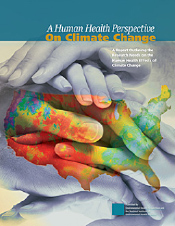Extreme Weather
- NIH Disaster Research Response
DR2 is the national framework for research on the medical and public health aspects of disasters and public health emergencies. - Hurricanes & Floods
These resources are aimed at protecting the health and safety of those responding to the aftermath of a hurricane or a flood, including emergency responders, skilled support personnel, homeowners, and business owners. - Mold Exposure
Mold Cleanup and Treatment orientation for workers, volunteers, and homeowners who engage in small-scale mold cleanup and treatment of flooded or water-damaged homes. - Wildfires
Resources and training in support of wildfire response operations in the United States. - Harmful Algal Blooms
A harmful algal bloom (HAB) occurs when toxin-producing algae grow excessively in a body of water.
Climate Change and Human Health Literature Portal
Explore the Climate Change and Human Health Literature Portal
A changing climate impacts our health and wellbeing. The major public health organizations of the world have said that climate change is a critical public health problem. Climate change makes many existing diseases and conditions worse, but it may also help introduce new pests and pathogens into new regions or communities. As the planet warms, oceans expand and the sea level rises, floods and droughts become more frequent and intense, and heat waves and hurricanes become more severe. The most vulnerable people—children, the elderly, the poor, and those with underlying health conditions—are at increased risk for health effects from climate change. Climate change also stresses our health care infrastructure and delivery systems.
Steps can be taken to lessen climate change (“mitigation”) and reduce its impacts on our health and the health of future generations (“adaptation”). Some of these steps can yield benefits for our health, environment, economy, and society at the same time. The federal government has called for efforts to support adaptation and mitigation of climate change to create healthier, more sustainable communities. The goals of the NIEHS Climate Change and Human Health Program align with these efforts.
Goals:
- Provide research on human health impacts related to climate change and adaptation
- Raise awareness and create new partnerships to advance key areas of health research and knowledge development on human health effects of climate change
- Serve as an authoritative source of information on human health effects of climate change for NIEHS stakeholders, including the public
- Represent NIEHS science in climate change research and policy activities at the NIH, HHS, federal government, and international levels
NIEHS Climate Change and Environmental Exposures Challenge

To help decision makers and communities identify areas and people at greatest risk to climate change impacts and prioritize protective actions, the National Institute of Environmental Health Sciences (NIEHS) sponsored the Climate Change and Environmental Exposures Challenge. Teams created data visualization tools and maps to connect current science on climate change to the exposure pathways for environmental hazards.
Learn more about the Challenge and view the winning tools.
Federal Reports on Climate Change and Health

The Impacts of Climate Change on Human Health
This 2016 assessment significantly advances what we know about the impacts of climate change on public health, and the confidence with which we know it.
Read the full report online

A Human Health Perspective on Climate Change
This 2010 report identifies gaps in our understanding of climate change and health, and the research needed to explore such gaps.
Read the full report online

Climate Change and Children’s Health Policy Roundup
Tell us your story! What are you doing in the form of policy actions and programs to protect children’s health against the impacts of climate change? Presidential Task Force on Environmental Health and Safety Risks to Children is gathering examples of policy actions at the Federal, State, Local, and Tribal levels to highlight during national Children’s Health Month in October. Any member of the public is welcome to submit. Compelling stories will be featured on the Task Force website, highlighted at an event during Children’s Health Month, and disseminated across the community of practice to raise awareness, share what’s working, and encourage others to adopt similar policies.
AGU Centennial Plenary
to Top


